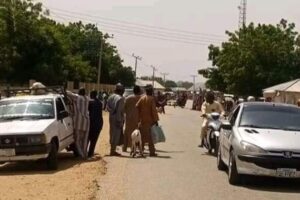EXPOSED: Boko Haram Plans To Have Separate Islamic Country, See Location
Militants belonging to the Islamic State-backed faction of Boko Haram, the Islamic State West Africa Province (ISWAP), formerly known as Jamā’at Ahl as-Sunnah lid-Da’wah wa’l-Jihād, have organised da‘wāt in some villages in Borno and Yobe states, SaharaReporters has gathered.
Islamic Country

Da‘wāt is the act of inviting or calling people to embrace Islam.
The insurgents appealed to the villagers to join the group as militants and support their cause to establish an Islamic caliphate.
Islamic Country

They also hoisted their flag in the villages, assuring them of good governance, better security and basic amenities as soon as they have a new country.
“Our target: those who do not believe in our ideology, Christians and even Muslims who do not believe in our teachings.
“Any Muslim who is not supporting the empire of Islam is our target.
“Anyone who comes to us for forgiveness, and stop fighting us will be exempted from attacks,” the group had said in a propaganda leaflets distributed to Geidam residents in April.
ISWAP also shared N20,000 to over 50 households in a new recruitment drive.
A 2019 report by the International Crisis Group, a non-profit think tank, observed that ISWAP’s approach to recruiting new fighters proved effective.
Islamic Country

Despite breaking away from the Abubakar Shekau-led Boko Haram faction in 2016, the population of its fighters had roughly doubled those of the latter according to estimates.
“Although its leadership has been largely ethnic Kanuri, ISWAP has recruited significantly among lacustrine communities, notably the ethnic Buduma, many of whom earn a living from fishing,” the group wrote.
The Institute for Security Studies (ISS) has made similar observations.
Read Also: Akwa Ibom Missing Job Seeker : Police Issues Fresh Update
“As part of this approach, the ideological aspect of the crisis must be dealt with. The ability of the group to recruit is one of the biggest reasons for its expansion, and so a deeper understanding of its recruitment patterns and operating mechanisms is crucial,” ISS senior researcher Remadji Hoinathy warned in May 2019.

Often ISWAP exploits gaps in governance by trying to prove that it can provide essential services in the areas under its control.









Add Comment